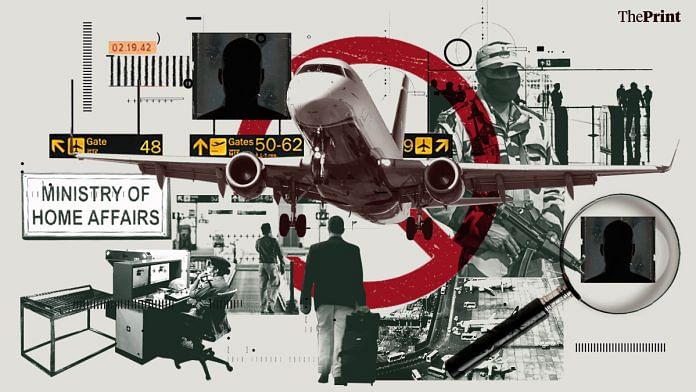New Delhi: Last week, the Delhi High Court said that a citizen’s fundamental right to travel abroad cannot be curtailed through a “lookout circular” (LOC) in every case where there is a failure to pay a loan.
Justice Subramonium Prasad of the Delhi High Court was hearing a case that sought to quash an LOC issued by the Bureau of Immigration (BOI), an agency under the Ministry of Home Affairs (MHA) responsible for immigration.
LOCs are notices which restrict individuals from leaving India for specified offences. This is similar to the “no-fly list” in the US.
The present case relates to a plea by the Bank of Baroda against one Shalini Khanna, who had provided guarantee for a credit facility to one Metaphor Exports Private Limited amounting to Rs 7 crores. Bank of Baroda claimed that almost Rs 5.85 crore of this amount were misappropriated by the firm’s directors, including Khanna.
The bank had initiated proceedings before the Debt Recovery Tribunal. The Central Bureau of Investigation (CBI), too, initiated a case under criminal conspiracy and cheating under the Indian Penal Code and the Prevention of Corruption Act.
Quashing the LOC, Justice Prasad said that an LOC could not have been issued in this case as the amount of about Rs 7 crore could not be said to be ‘detrimental to India’s economic interests’.
This criterion of “detrimental to economic interests” is frequently invoked to issue an LOC against individuals. This is done under the Centre’s office memorandum, which provides guidelines for issuing the circular in specified circumstances.
This comes in the wake of repeated orders from across the country with courts frequently quashing such LOCs. The Delhi HC observed that such LOCs are not “feasible” to extract money from defaulters. The HC has also warned that such a circular is a “coercive measure” and must only be used “sparingly”.
BharatPe founder Ashneer Grover and wife Madhuri Jain had also been stopped from their travel to New York in November last year based on an LOC issued by the Economic Offences Wing (EOW). The couple had also moved the Delhi HC against the LOC.
So, what is an LOC and when can it be issued? ThePrint explains.
LOC only for penal offences, but with exceptions
An LOC is a notice issued by the Bureau of Immigration to restrict foreign travel of individuals at the request of investigating authorities and public sector banks to prevent such individuals from leaving India’s borders.
These notices are issued under an office memorandum (OMs) issued by the MHA in 2021, which provides consolidated guidelines for opening LOCs against Indian citizens or foreigners.
The guidelines categorically provide that LOCs can only be opened in criminal or penal cases, and the reason for the LOC must be indicated with the issue of the circular. If there is no criminal or penal case pending, the LOC cannot be issued, and agencies can only request that they be informed of departure or arrival.
“In cases where there is no cognizable offence under the IPC and other penal laws, the LOC subject cannot be detained/arrested or prevented from leaving the country. The Originating Agency can only request that they be informed about the arrival/departure of the subject in such cases,” provides the guidelines.
However, the guidelines provide that in exceptional cases, an LOC may be issued against an individual even when the case is not a criminal case. This is in specified circumstances, such as when it is detrimental to the “sovereignty or security or integrity of India”, the “bilateral relations with any State”, or to the “strategic and economic interests of India”.
LOCs are also permitted in cases where the individual is likely to engage in terrorism or offences against the State or when such departure would not be “in the larger public interest”.
Mandatory basic details, review, and legal consequences
LOCs cannot be issued unless basic details — including name/parentage, passport number, and date of birth — are available, and such requests must be constantly monitored.
“It is the responsibility of the originator to constantly review the LOC requests and proactively provide additional parameters to minimise harassment to genuine passengers,” the guidelines say.
It is also required that any LOC issued must be reviewed on a quarterly and annual basis by agencies that request such restrictions, and the result of the review must be informed to the MHA.
Notably, the MHA has categorically transferred the legal consequences of issuing an LOC to the originating agency, even though such OMs are issued by the Bureau of Immigration.
“The legal liability of the action taken by the immigration authorities in pursuance of the LOC rests with the originating agency,” the guidelines make clear.
The power to issue such OMs and LOCs is sourced from The Passports Act, 1967, the key legislation for the grant of passports, travel documents, and “endorsements” to travellers at the time of emigration or immigration.
Section 6 of the Act provides that the passport authority may refuse to make such endorsement if it is not in the public interest.
“Subject to the other provisions of this Act, the passport authority shall refuse to make an endorsement for visiting any foreign country…that in the opinion of the Central Government, the presence of the applicant in such country is not in the public interest,” sub-clause (d) of Section 6 notes.
(Akshat Jain is a student at the National Law University, Delhi, and an intern with ThePrint)
(Edited by Zinnia Ray Chaudhuri)
Also read: ‘Civil partnership’ in UK, ‘cohabitation’ in France — how other countries view live-in relationships



